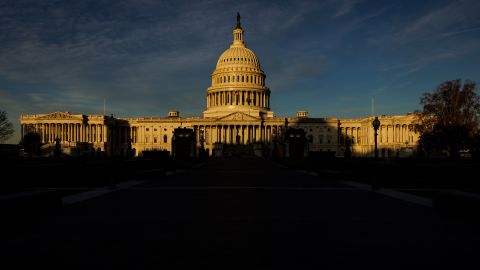
House expected to vote on $1.7 trillion government spending bill as funding deadline looms


CNN —
The House is expected to vote on a massive $1.7 trillion spending bill Friday as lawmakers look to avoid a government shutdown before rushing home for the holiday break.
The Senate passed the measure Thursday, just ahead of Friday night’s funding deadline, along with a bill to extend the deadline by one week, to December 30, in order to give enough time for the year-long bill to be formally processed and sent to President Joe Biden’s desk next week.
The House is expected to approve the same one-week extension before it votes on the yearlong bill.
The timing of final passage of the broader bill, however, could be drawn out if House GOP Leader Kevin McCarthy delivers an extended floor speech, known as a “magic minute,” which allows party leaders in the House to speak for as long as they want.
Members on both sides of the aisle told CNN they are hearing the California Republican could make such a speech, which could eat up lots of time before they could call the vote on the larger spending bill. CNN has reached out to McCarthy’s office for comment.
House Majority Leader Steny Hoyer had said on the floor Thursday the chamber will start votes after 9 a.m. ET, with at least one procedural vote before they get to final passage later in the day.
The massive spending bill for fiscal year 2023, known on Capitol Hill as an omnibus, provides $772.5 billion for non-defense, domestic programs and $858 billion in defense funding. It includes roughly $45 billion in emergency assistance to Ukraine and NATO allies and roughly $40 billion to respond to natural disasters like hurricanes, wildfires and flooding.
Other key provisions in the bill include an overhaul of the 1887 Electoral Count Act aimed at making it harder to overturn a certified presidential election – the first legislative response to the US Capitol insurrection and then-President Donald Trump’s relentless pressure campaign to stay in power despite his 2020 loss. The spending bill also includes the Secure Act 2.0, a package aimed at making it easier to save for retirement, and a measure to ban TikTok from government devices.
The legislative text of the package, which runs more than 4,000 pages, was released in the middle of the night – at around 1:30 a.m. ET on Tuesday – leaving little time for rank-and-file lawmakers, and the public, to review its contents before Congress plans to vote to pass it.
After its release, the giant government funding bill stalled for days over a GOP amendment regarding the Trump-era immigration policy, Title 42, that could have sunk the entire $1.7 trillion legislation in the Democratic-controlled House.
GOP Sen. Mike Lee of Utah insisted on getting a vote on his amendment to keep in place the immigration policy that allows migrants to be turned back at the border, which Republicans strongly support. Because Lee’s measure was expected to be set at a simple majority threshold, there was concern it would pass and be added to the government funding bill as several centrist Democrats back extending the policy – only for it to later be rejected in the House.
But senators had a breakthrough in negotiations Thursday morning.
Sens. Kyrsten Sinema of Arizona and Jon Tester of Montana wrote an amendment in an attempt to give moderates an alternative way to vote in support of extending Title 42, which the administration and most Democrats want to get rid of.
As expected, both amendments did not pass. Lee’s amendment to extend the Trump-era immigration policy failed 47-50. The Democratic alternate version from Sinema-Tester went down 10-87.
Source: https://www.cnn.com/2022/12/23/politics/house-vote-spending-bill/index.html

















